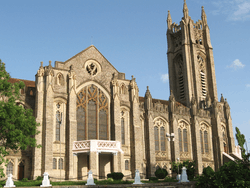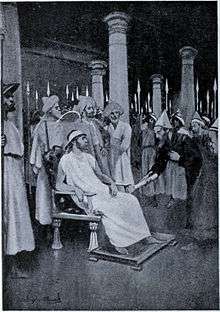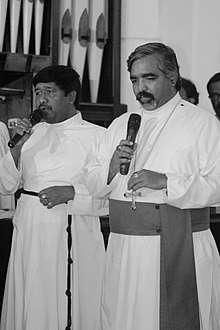Diocese of Medak of the Church of South India
The Diocese of Medak is one of the prominent Dioceses in the Church of South India, a Protestant Uniting Church with its headquarters in Medak comprising nearly 200[3] Presbyters ministering to Telugu, Lambadi, Tamil,[2] Kannada, Malayalam,[5] Hindustani (Hindi and Urdu),[6] English[2] and other linguistic groups numbering nearly 1/3rds[1] of a million spread over 105[1] pastorates and administered through 3 District Church Councils[1] (DCC), namely, the Town DCC, the Medak DCC and the Godavari DCC geographically located in the erstwhile civil districts of Adilabad, Nizamabad, Medak, Rangareddy, Hyderabad and Mahboobnagar in Telangana.
Diocese of Medak | |
|---|---|
 | |
| Location | |
| Country | India |
| Territory | Telangana |
| Deaneries | 3 District Church Councils (DCC) (Godavari DCC, Medak DCC, and Town DCC)[1] |
| Subdivisions | 105 Pastorates[1] |
| Headquarters | Medak |
| Statistics | |
| Members | 1/3rds of a million[1] |
| Information | |
| Denomination | Protestant |
| Rite | Church of South India (A Uniting church comprising Wesleyan Methodist, Congregational, Lutheran, Calvinist and Anglican missionary societies – SPG, WMMS, LMS, Basel Mission, CMS, and the Church of England) |
| Established | 3 October 1947[2] |
| Cathedral | Medak Cathedral |
| Secular priests | 200[3] |
| Language | English, Hindi, Kannada, Lambadi, Malayalam, Tamil, Telugu, Urdu |
| Calendar | Church of South India Liturgical calendar |
| Music | Contemporary worship music |
| Current leadership | |
| Parent church | Church of South India Synod |
| Patriarch | A. Dharmaraj Rasalam (Moderator) |
| The Right Reverend | A. C. Solomon Raj |
| Vicar General | The Reverend T. Bhaskar (Vice-Chairperson of the Diocese)[3] |
| Archdeacons | |
| Website | |
| CSI Medak Diocese | |
History
Christianity in India

Saint Bartholomew, one of the Twelve Apostles landed[7] in Maharashtra and began his mission in Kalyan[8] and was followed by Saint Thomas[7] who landed in Gujarat during the reign of King Gondophares[9] and initiated the Gospel in parts of Bharuch[10] and Taxila before traveling southward to Kerala in 52 A.D. where he won many converts and established many churches, eventually traveling to Tamil Nadu where he was martyred in 72 A.D. After centuries of inactivity, the missions were again revived with the arrival of Saint Francis Xavier in 1542 followed by Robert de Nobili in 1605 who arrived in Goa on the western coast. The first Protestant missionaries arrived in 1706 with Bartholomäus Ziegenbalg and Heinrich Plütschau of the Lutheran Missions who landed at Tranquebar on the eastern coast of Tamil Nadu. However, the modern missions began to take shape only with the arrival of the Baptist Missions in 1793 led by William Carey, the Father of the Modern Missionary Movement.[11]
It was with this background[12] that Jawaharlal Nehru,[13] the first Prime Minister of India remarked in a parliamentary debate in 1955[14] in the Lok Sabha that,
"Christianity in India is as old as Christianity itself."
Christianity in Telangana
The Roman Catholic missionaries first set foot in the erstwhile Hyderabad State in 1535[2] during the sixteenth century followed by the American Methodist missions in 1873,[2] the Baptist missions in 1875,[2] the Mennonite Brethren missions then followed by the Wesleyan Methodist missions in 1878[15][2] during the nineteenth century.
The beginnings of the church
Once the Wesleyan Methodist Missionary Society set foot in the erstwhile Hyderabad State in 1878,[2] the missionaries led by Henry Little, William Burgess and the Indian Evangelist Benjamin Wesley[2] who pioneered the spread of the Gospel and helped in establishing of churches in areas northward of Hyderabad City winning of new converts to the fold of Christianity.
Meanwhile, efforts were made by visionary Pastors to form the Church of South India for which missionary societies came forward for negotiations who included[16] Anglicans, Baptists, Congregationalists, Lutherans, and Wesleyan Methodists. However, the talks towards Church Union did not go well with the laymen hailing from the Baptists and the Lutherans in spite of efforts by their Clergy[17] led by Professor Muthyala Theophilus, CBCNC and William Powlas Peery, AELC[18] to join the Church of South India. Meanwhile in 1923,[19] the Wesleyan Methodist Missionary Society participated in the negotiations towards Church union and formally agreed to join the Church of South India in 1947 and Frank Whittaker became the first Bishop of the Diocese of Medak.
The CSI and aftermath
From 1947 onward, the church came under the Church of South India overseen by a Bishop residing in Medak, the ecclesiastical headquarters of the Diocese of Medak and was overseen by Bishops beginning with Frank Whittaker. The Bishops used to appoint Pastors to lead the congregations in Christian love and faith so that the Christians lead selfless lives and set example for others. The Clergy consisted of Pastors who had theological grounding under able scholars in seminaries either at the Andhra Christian Theological College or at the United Theological College, Bangalore.[2] The church also had visiting preachers from the nearby seminary, the Andhra Christian Theological College as well as other non-CSI churches in the city.
Ministerial formation

The Ministerial Secretary of the Diocese of Medak acts as the Vocation Promoter and for those discerning their avocation towards priesthood, the Diocese of Medak through its Ministerial Secretary examines candidates to determine their preparedness for the priestly vocation at varying points of time. First, candidates are admitted to the Diocese of Medak and attached with a Priest in congregations and after a year or two they are sent for ministerial formation to a seminary affiliated to the Senate of Serampore College (University). Presently, the Diocese of Medak divides candidates between the Andhra Christian Theological College, Secunderabad and to the United Theological College, Bangalore.
It was in Medak[20] that the first seminary was established prior to 1947.[20] Incidentally, this College moved over to Dornakal and became the Andhra Union Theological College which later in 1964[21] joined hands with the Anglicans, Baptists, Congregationalists, Lutherans, Methodists and Wesleyan Methodists to form the Andhra Christian Theological College,[21] originally located in Rajahmundry and moved to Secunderabad in 1972.[22] The Diocese is also represented in the United Theological College, Bangalore which was established in 1910.[20]
The Diocese of Medak through its scholarly Clergy has also been involved in ministerial formation both at the Andhra Christian Theological College, Secunderabad and at the United Theological College, Bangalore. Some of its Clergy who have been sent on lien to teach elsewhere include,
| Name of the Presbyter | Specialization | Seminary | Year's taught |
|---|---|---|---|
| Frank Whittaker | Theology | Andhra Union Theological College, Dornakal | 1960-61 |
| Eric J. Lott | Religions | Andhra Union Theological College, Dornakal, Andhra Christian Theological College, Rajahmundry/Secunderabad and United Theological College, Bangalore | 1962-64, 1964–76, 1977–88 |
| M. Vidyanandam[23] | Old Testament | Andhra Christian Theological College, Rajahmundry | 1964-66 |
| P. Victor Premasagar | Old Testament | Andhra Union Theological College, Dornakal and Andhra Christian Theological College,Rajahmundry/Secunderabad | 1964-66, 1966–80 |
| R. Yesurathnam | Systematic theology | Andhra Christian Theological College, Secunderabad | 1973-01 |
| P. Surya Prakash | New Testament and Homiletics | United Theological College, Bangalore | 1991-00 |
| Ch. Vasantha Rao | Old Testament | Andhra Christian Theological College, Secunderabad and United Theological College, Bangalore | 1994-17, 2017- |
| M. John Sundar | New Testament | Andhra Christian Theological College, Secunderabad | 2007-14 |
Diocese Administrators
The Bishops that have led the Diocese of Medak were notable and exemplary and having focused on the objective of the Mission and Evangelism as shown through the Gospels. The lives of the Bishops have been documented by Church historians and available in book form include,
- Rajaiah David Paul, The First Decade: An Account of the Church of South India, published by the Christian Literature Society, Chennai, 1958,[24]
- Rajaiah David Paul, Ecumenism in action: a historical survey of the Church of South India, published by the Christian Literature Society, Chennai, 1972,[25]
- K. M. George, Church of South India: Life in Union, 1947-1997, Jointly published by Indian Society for Promoting Christian Knowledge, New Delhi and Christava Sahitya Samithi, Tiruvalla, 1999,[26]
| From[A] | Until[B] | Incumbent | Notes (earned theological credentials) |
|---|---|---|---|
| 27.9.1947 | Mar 1960[27] | Frank Whittaker | M.A. (Cambridge) |
| Apr 1960 | 31.10.1960 | See vacant (overseen by the Church of South India Synod: H. Sumitra) | |
| 1.11.1960[27] | 1967 | Eber Priestley | B.A. (Birmingham) |
| 1967 | 1968 | See vacant (overseen by the Church of South India Synod: P. Solomon) | |
| 3.2.1969[28] | 1975 | H. D. L. Abraham | B.D. (Serampore) |
| 1975 | 1976 | See vacant (overseen by the Church of South India Synod: N. D. Ananda Rao Samuel) | |
| 1976 | 1981 | B. G. Prasada Rao | B.D. (Serampore), M.Th. (Serampore) |
| 1981 | 1983 | See vacant (overseen by the Church of South India Synod: Solomon Doraiswamy and I. Jesudason) | |
| 1983 | 1992 | P. Victor Premasagar | B.D. (Serampore), M.A. (Cambridge), Ph.D. (St Andrews) |
| 1992 | Aug 1993 | See vacant (overseen by the Church of South India Synod: Ryder Devapriam) | |
| Sep 1993 | Sep 2008 | B. P. Sugandhar | B.D. (Serampore) |
| Sep 2008 | 16.8.2009 | See vacant (overseen by the Church of South India Synod: P. Surya Prakash and J. W. Gladstone) | |
| 17.8.2009 | 2012 | T. S. Kanaka Prasad | B.Th. (Serampore), B.D. (Serampore) |
| 2012 | 11.10.2016 | See vacant (overseen by the Church of South India Synod: G. Dyvasirvadam) | |
| 12.10.2016 | A. C. Solomon Raj | B.D. (Serampore), M.Th. (Serampore) | |
- A note on Assistant Bishop - in - Medak (Bishop Bunyan Joseph)
During the 1950s, the Diocese accommodated Bishop Bunyan Joseph of the erstwhile Anantapur-Kurnool Diocese which had since been integrated into Rayalaseema Diocese. He was Assistant[29] Bishop - in - Medak and worked together with Frank Whittaker, Eber Priestley, B. G. Prasada Rao[29] and others. Bunyan Joseph also served as Presbyter - in - Charge at the CSI-Church of St. John the Baptist, Secunderabad during 1956-57[30] and 1960-61[30] until he finally retired in October 1963.[31]
Churches
| Church | Location | Founding Year | Founding Mission |
|---|---|---|---|
| CSI- Church of St. John the Baptist | Secunderabad | 1813 | Church of England (CoE) |
| CSI-Garrison Wesley Church | Secunderabad | 1881 | Wesleyan Methodist Missionary Society (WMMS) |
| CSI-Holy Trinity Church | Secunderabad | 1847 | Church of England (CoE) |
| CSI-St. George's Church | Hyderabad | 1844 | Church Missionary Society (CMS)[32] |
| CSI-Christ Church | Hyderabad | 1868 | Society for the Propagation of the Gospel (SPG) |
| CSI-All Saints Church | Secunderabad | 1860 | Church of England (CoE) |
| CSI-Medak Cathedral | Medak | 1924 | Wesleyan Methodist Missionary Society (WMMS) |
| CSI- St. Luke's Hindustani Church | Hyderabad | 1919[32] | Church Missionary Society (CMS)[32] |
Further reading
- CSI (Medak Diocese) UK Telugu Christians Souvenir commemorating the 70th year of the formation of the Church of South India (2016). "70 years of God's Faithfulness" (PDF). Archived from the original (PDF) on 27 August 2017. Retrieved 14 May 2017. Cite journal requires
|journal=(help) - Church of South India Synod (2015). "Lenten retreat for Medak Diocese Pastors". Cite journal requires
|journal=(help) - John Braisted Carman, Chilkuri Vasantha Rao (2014). Christians in South Indian Villages, 1959–2009: Decline and Revival in Telangana. ISBN 978-0-8028-7163-3.
- Jerald D. Gort, Henry Jansen, H. M. Vroom (Edited) (2006). Religions View Religions: Explorations in Pursuit of Understanding. 25. ISBN 90-420-1858-5.CS1 maint: multiple names: authors list (link)
- Anantha Sudhaker Babbili (2000). The Road from Poodur in Biographical Passages: Essays in Victorian and Modernist Biography : Honouring Mary M. Lago, University of Missouri, North America. ISBN 978-0-8262-1256-6.
- K. M. George (1999). Church of South India: Life in Union, 1947-1997. ISBN 8172145128. OCLC 1039224320.
- K. M. Hiwale (Compiled) (1997). "Directory of the United Theological College 1910–1997". Cite journal requires
|journal=(help) - P. Y. Luke, J. B. Carman (1968). Village Christians and Hindu Culture. ISBN 978-8-1845-8089-1.
References
- 70 years of God's Faithfulness: CSI (Medak Diocese) UK Telugu Christians Souvenir commemorating the 70th year of the formation of the Church of South India, 2016. Archived 27 August 2017 at the Wayback Machine
- P. Y. Luke, J. B. Carman, Village Christians and Hindu Culture, Lutterworth Press, Cambridge, 1968, pp.15, 17, 24.
- Church of South India Synod - Medak Ministerial Details.
- Georgette 2019 - Annual magazine of CSI-St. George's Girls' Grammar School
- Immanuel CSI Malayalam Church, Hyderabad
- Dinesh K. Agarwal, Great Struggle: Bishop's Story, Patridge publishing, New Delhi, 2016.
- George Nedungatt, Quest for the Historical Thomas Apostle of India: A Re-reading of the Evidence, Theological Publications in India, Bangalore, 2008.
- A. C. Perumalil, The Apostles in India, Xavier Teachers' Training Institute, Patna, 1971.
- See Acts of Thomas
- James Kurikilamkatt, First Voyage of the Apostle Thomas to India: Ancient Christianity in Bharuch and Taxila, Asian Trading Corporation, Bangalore, 2005.
- Timothy C. Tennent, Invitation to World Missions: A Trinitarian Missiology for the Twenty-first century, Kregel, Grand Rapids, 2010, p.259.
- Manohar Samuel, Christianity in S. Muthiah (Edited), Madras, Chennai: A 400-year Record of the First City of Modern India, Volume 1, Palaniappa Brothers, Madras, 2008, pp.160-184.
- Jawaharlal Nehru, Discovery of India, Penguin, New Delhi, 2008.
- Andrew Wingate, The Meeting of Opposites?: Hindus and Christians in the West, Cascade Books, Eugene, 2014.
- Lasania, Y. Yunus (21 November 2015). "162-year-old and still going strong". The Hindu. Hyderabad. Retrieved 5 November 2016.
- Rajaiah David Paul, J. Kumaresan, Church of South India-Lutheran Conversations: A Historical Sketch, Christian Literature Society, Madras, 1970, p.40.
- D. J. Jeremiah, The Relationship of the Baptist Churches in Andhra Pradesh to the Church Union Movement in South India since 1919 in Reflections on Theology Today: Papers Presented by the ACTC Faculty during the Academic Year 1988–89 on Theology and the Mission and Ministry of the Church, Andhra Christian Theological College, Hyderabad, 1990, pp.54-73.
- CSI-Lutheran Inter Church Commission
- Paul M. Collins, Christian Inculturation in India, Ashgate Publishing, 2007.
- Anthony Tyrrell Hanson, Beyond Anglicanism, Darton, Longman & Todd, 1965 , p.65.
- J. Herbert Kane, A Global View of Christian Missions from Pentecost to the Present, Baker Book House, 1971, p.120.
- Yearbook of the American Baptist Churches in the U.S.A., 1973, p.143.
- Sir Stanley Reed (Compiled), The Times of India Directory and Year Book Including Who's who 1954, Bennett, Coleman & Company, Calcutta, 1954, p.961.
- Rajaiah David Paul, The First Decade: An Account of the Church of South India, The Christian Literature Society, Chennai, 1958.
- Rajaiah David Paul, Ecumenism in action: a historical survey of the Church of South India, The Christian Literature Society, Chennai, 1972.
- K. M. George, Church of South India: Life in Union, 1947-1997, Jointly published by Indian Society for Promoting Christian Knowledge, New Delhi and Christava Sahitya Samithi, Tiruvalla, 1999.
- Rajaiah David Paul, Ecumenism in action: a historical survey of the Church of South India, The Christian Literature Society, Chennai, 1972, p.86
- Rajaiah David Paul, Ecumenism in action: a historical survey of the Church of South India, Christian Literature Society, Madras, 1972, p.159.
- Sir Stanley Reed (Compiled), The Times of India Directory and Year Book Including Who's who 1957, Times of India Press, Calcutta, 1957, p.903.
- CSI-Church of St. John the Baptist, History of the Diocese - Presbyters.
- Rajaiah David Paul, Ecumenism in action: a historical survey of the Church of South India, Christian Literature Society, Madras, 1972, p.107.
- Itihas, Volume 11, 1983, pp.296-298